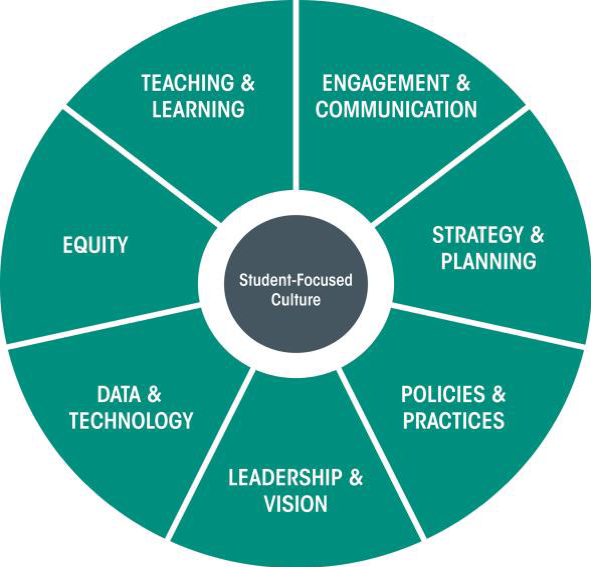
Assessing the capacities needed by an institution to adopt a student focused culture
Takalani Rambau
As part of the Siyaphumelela Network of 14 universities, Saide and the Siyaphumelela coaches are supporting universities in using a custom made tool to understand their strengths and weaknesses in their capacity to support student success.
Following on from the success of the Know Your Data workshops hosted by Saide towards the end of last year, coordinating and supporting the new Siyaphumelela partner universities[1] to implement the Institutional Capacity Assessment Tool (ICAT) is a key focus on the current Siyaphumelea 2.0 programme of activities.
The ICAT used in South Africa is an adaptation of the American, Achieve the Dream’s diagnostic tool. The adaption process was led by Alan Amory, at Saide. Explaining what ICAT is all about, Alan Amory explains that,
…the assessment process asks a broad range of university stakeholders to assess their institution’s capacity across seven dimensions. Once an institution completes the assessment, the participants engage in an ICAT Café, the format used to facilitate a large group dialogue, to reflect on and use the assessment results to celebrate strengths, prioritise areas for improvement and to identify concrete actions for building capacity to support student success efforts.
The seven institutional dimensions assessed, are brought together in the Institutional Capacity Framework exemplified in Figure 1.

Figure 1: The seven key dimensions of the Institutional Capacity Framework
The Siyaphumelela coaches liaise with the universities, introducing the ICAT to the university management and providing support to each institution for the roll out of the ICAT and the facilitation of the ICAT/Capacity Café reflection and dialogue.
The importance of universities developing the seven dimensions highlighted in the Institutional Capacity Framework was underscored by Karen A. Stout, (Achieving the Dream President and CEO) who has stressed that, particularly in times of rapid change, such as in the current Covid-19 Pandemic, as well as when facing intractable challenges such as the impacts of systemic racism, “the ability to be flexible and to adapt is critical”. However, she states that “building adaptive capacity for resiliency and agility” [2] is contingent on institutions having strength in each the seven ICAT capacity areas.
Key benefits of administering the ICAT include:
- Assisting universities to understand the seven capacity areas essential to cultivating a student focused culture.
- Elevating the value of capacity building in systemic institutional transformation to help universities move beyond an intervention-only focus.
- Assisting universities in gauging where they are, assessing their capacity building needs and informing action.
- Integrating and aligning efforts institutions may have already begun to implement such as, strategic planning, holistic student support as well as assessing readiness for future redesign efforts.
- Providing opportunity for tailored coaching services and support to assist universities in optimising capacity.
While it is still too early to report on the results of implementing the ICAT in the individual universities in the Siyaphumelela Network, the use of this tool in the US has resulted in positive outcomes. US institutions provide evidence of the ICAT contributing positively to building the capacity of higher education institutions to provide support to students in all aspects of their institutional experience and thereby to promoting student success.
Saide looks forward to reporting on new interventions implemented at the Siyaphumelela Network universities in the future.
[1] University of Venda, North West University, University of KwaZulu-Natal, Cape Peninsular University of Technology, University of Zululand, Sol Plaatjie University, Walter Sisulu University, University of Western Cape and University of Cape Town
Image Courtesy of Scott Graham - Unsplash.com

